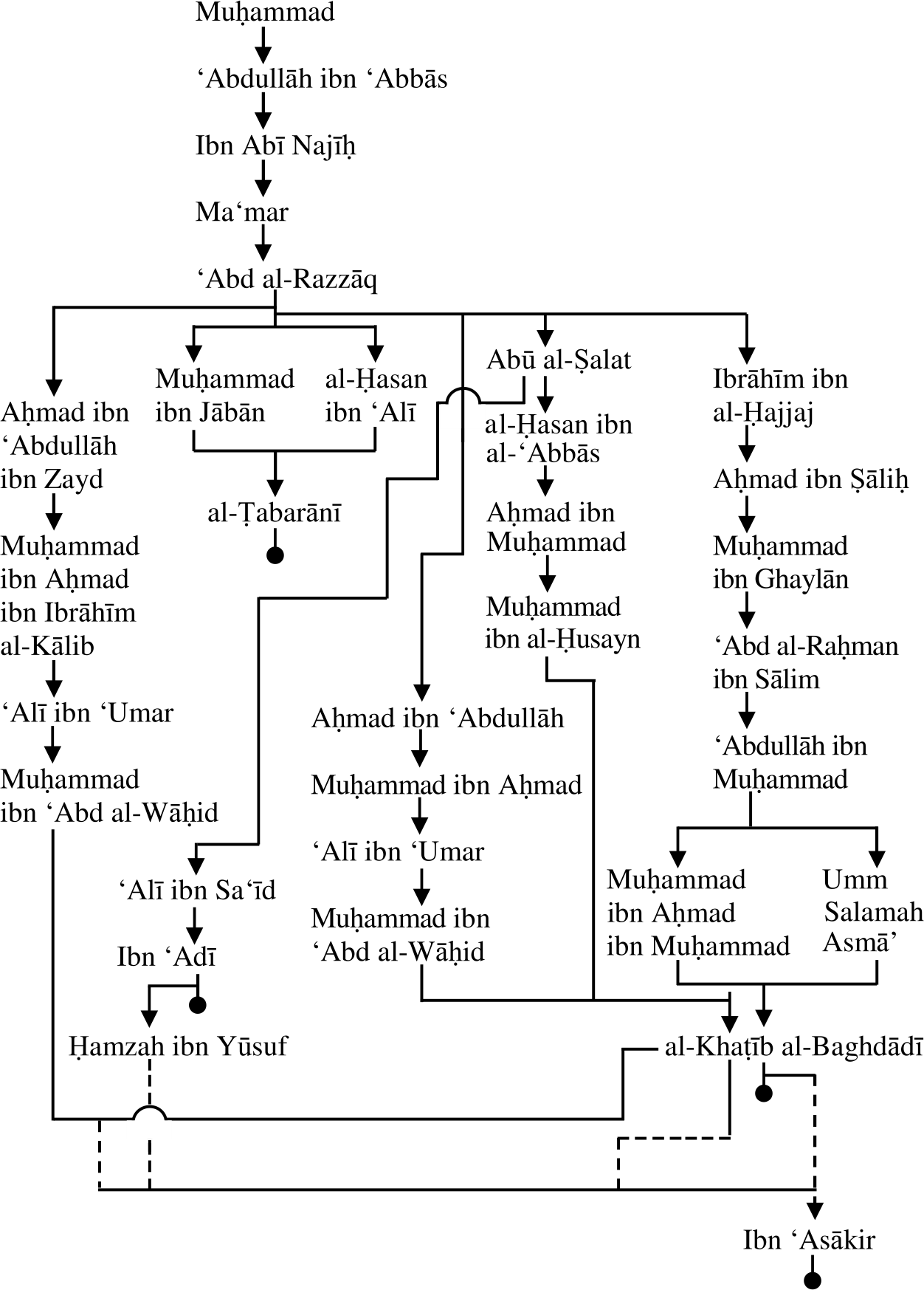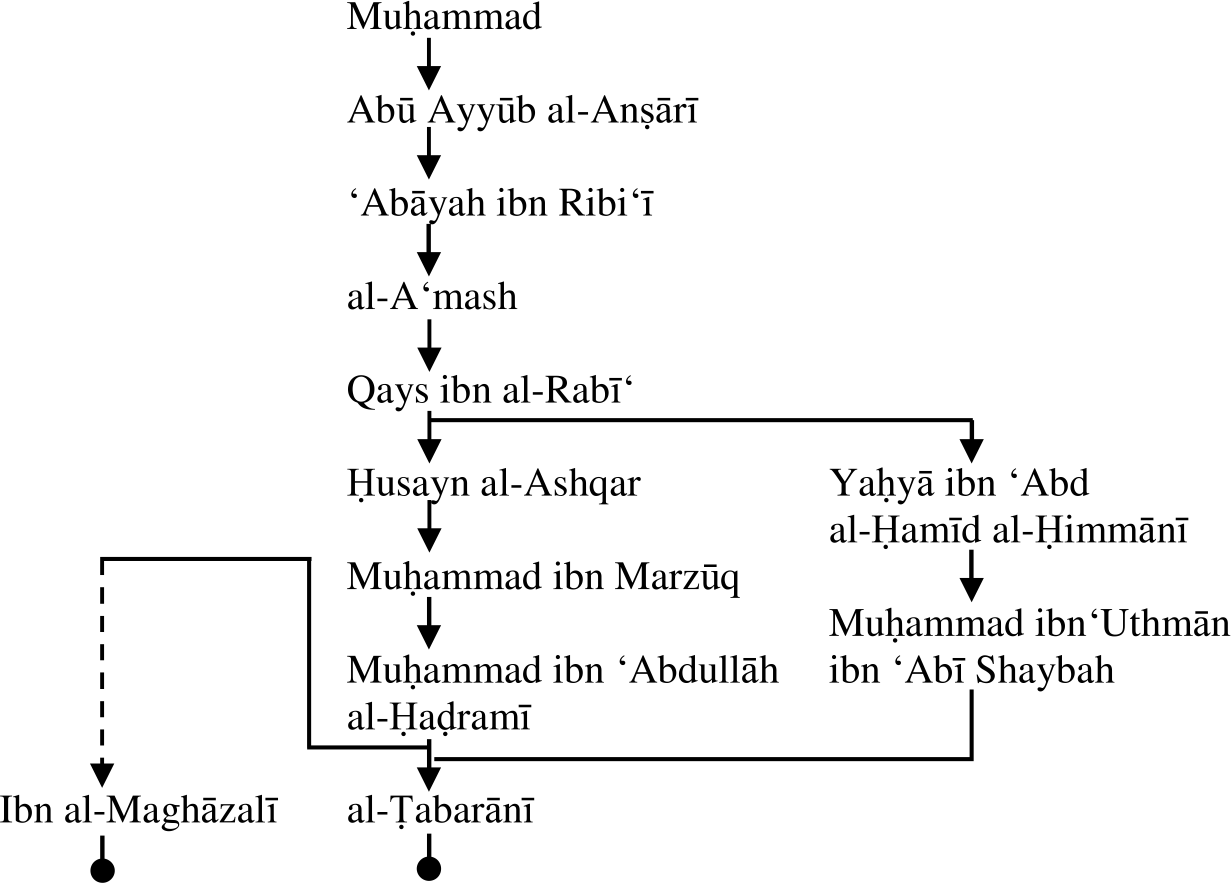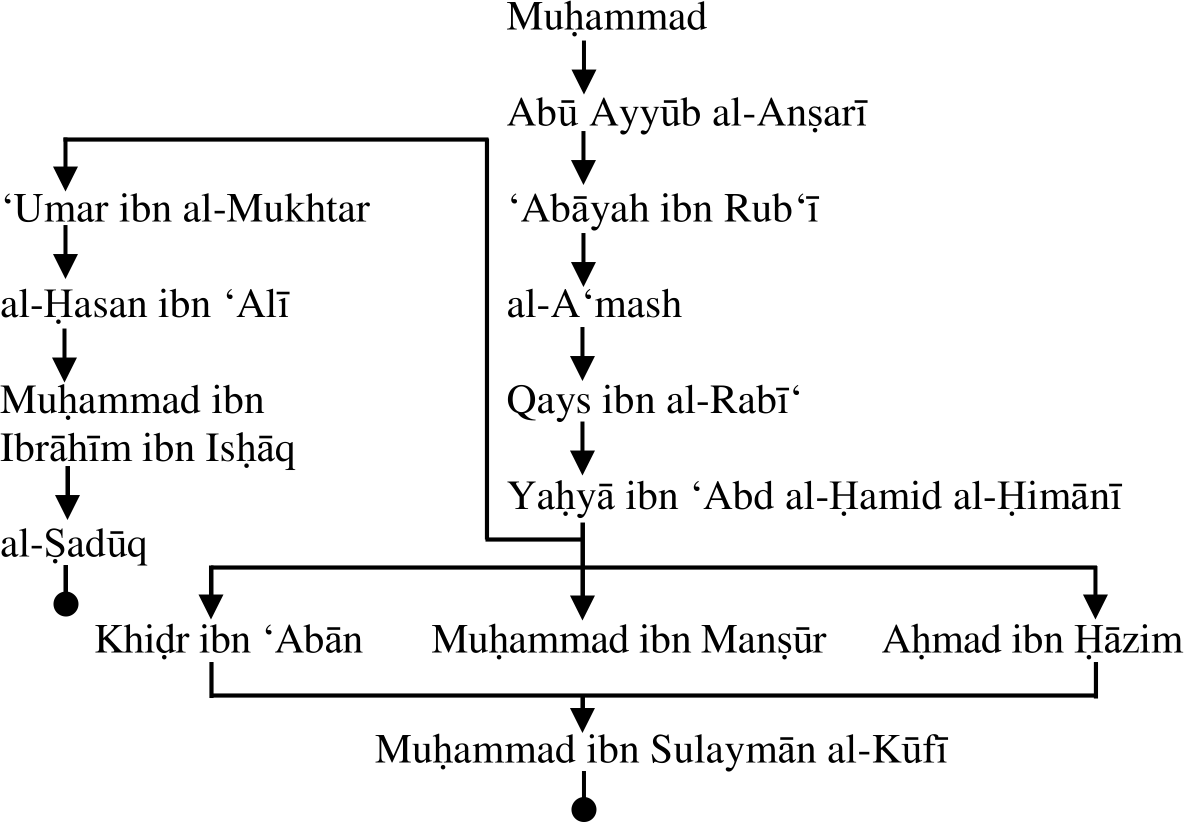1. ‘Abdullah ibn ‘Abbas (rta)
حدثنا محمد بن جَابَانَ الجنديسابوري
وَالْحَسَنُ بن عَلِيٍّ الْمَعْمَرِيُّ قالا ثنا عبد الرَّزَّاقِ
عن مَعْمَرٍ عَنِ بن أبي نَجِيحٍ عن مُجَاهِدٍ عَنِ بن عَبَّاسٍ
قال لَمَّا زَوَّجَ النبي صلى اللَّهُ عليه وسلم فَاطِمَةَ
عَلِيًّا قالت فَاطِمَةُ يا رَسُولَ اللَّهِ زَوَّجْتَنِي من
رَجُلٍ فَقِيرٍ ليس له شَيْءٌ فقال رسول اللَّهِ صلى اللَّهُ
عليه وسلم أَمَا تَرْضَيْنَ يا فَاطِمَةُ أَنَّ اللَّهَ عز وجل
اخْتَارَ من أَهْلِ الأَرْضِ رَجُلَيْنِ أَحَدُهُمَا أَبُوكِ
وَالآخَرُ زَوْجُكِ
‘Abdullah ibn
‘Abbas stated: “When the Prophet (sws) wedded Fatimah to ‘Ali,
she said: “O God’s Messenger! You have wedded me to a person
who is a pauper and has nothing.” At this, God’s Messenger
replied: “O Fatimah, would you be happy that God, the Mighty,
the Exalted has chosen two people from the inhabitants of the
earth. One of them is your father and the other is your
husband.”
Following is
the schematic illustration of the isnad of this narrative’s
variants:

No information
is available on Ahmad ibn ‘Abdullah ibn Zayd al-Hushaymi and
Muhammad ibn Ahmad ibn Ibrahim al-Katib.
Nothing is
known about Muhammad ibn Sa‘id ibn Jaban.
About al-Hasan ibn ‘Ali al-Ma‘mari, Ibn
‘Adi makes mawquf narratives into marfu‘ and adds things in
the text of a narrative which are not part of it.
About Abu Salat ‘Abd al-Salam ibn Salih al-Harwi
(d. 236 AH), Abu Hatim says that he
is da‘if and that he would not narrate from him; Abu Zur‘ah
would also not narrate from him.
Ibn Hibban says that it is not permissible to narrate from
him.
Al-Dhahabi records about him: Ibn ‘Adi says that he is
muttahim; al-Nasa’i says that he is laysa bi thiqah; al-Daraqutni
says that he is blamed of concoction; Yahya regarded him to be
trustworthy.
Al-Dhahabi says that Ibrahim ibn al-Hajjaj
and the narrative [under discussion] is baseless.
2. Abu Ayyub al-Ansari (rta)
حدثنا محمد بن عبد اللَّهِ الْحَضْرَمِيُّ
ثنا محمد بن مَرْزُوقٍ ثنا حُسَيْنٌ الأَشْقَرُ ثنا قَيْسٌ عَنِ
الأَعْمَشِ عن عَبَايَةَ بن رِبْعِيٍّ عن أبي أَيُّوبَ
الأَنْصَارِيِّ أَن ّرَسُولَ اللَّهِ صلى اللَّهُ عليه وسلم قال
لِفَاطِمَةَ رضي اللَّهُ عنها أَمَا عَلِمْتِ أَنَّ اللَّهَ عز
وجل اطَّلَعَ إلى أَهْلِ الأَرْضِ فَاخْتَارَ منهم أَبَاكِ
فَبَعَثَهُ نَبِيًّا ثُمَّ اطَّلَعَ الثَّانِيَةَ فَاخْتَارَ
بَعْلَكِ فَأَوْحَى إلي فَأَنْكَحْتُهُ وَاتَّخَذْتُهُ وَصِيًّا
Abu Ayyub al-Ansari
reported that God’s Messenger said to Fatimah (rta): “Do you
know that God, the Mighty, the Exalted, appeared to the people
of the earth and chose from them your father and made him a
prophet; then he appeared a second time and chose your
husband. He then sent the revelation to me to marry him to you
and to make him my successor.”

‘Abayah ibn
Rub‘i is an extremist Shiite and the narrative supports his
beliefs and hence becomes unreliable.
It may be noted that al-A‘mash according to
Mizan al-i‘tidal
is a mudallis and does tadlis from weak narrators and would
not name them. This narrative is mu‘an‘an. According to the
history of Yahya ibn Ma‘in, his pupil ‘Uthman ibn Sa‘id al-Darimi
declares that al-A‘mash is guilty of the worst form of tadlis:
tadlis al-taswiyah.
Qays ibn Rabi‘ (d. 167 AH) is very suspect.
Al-Mizzi records: Ahmad ibn Hanbal says that he narrates
ahadith munkarah; according to Yahya ibn Ma‘in he is: da‘if,
la yuktabu hadithuhu, laysa bi shay’, laysa hadithahu bi
shay’, da‘if al-hadith la yusawi shay’ (all these four
opinions of Yahya are reported from different authorities);
‘Amr ibn ‘Ali states that Yahya and ‘Abd al-Rahman would not
narrate from him; the latter did initially narrate from him;
but then abandoned him; ‘Ali ibn al-Madini regards him to be
da‘ifun jiddan; Ibn Numayr reported that scholars of Hadith
are of the opinion that his son had altered his narratives;
Waki ‘ would also regard him as da‘if; Ibrahim al-Juzjani
regards him to be saqit; Abu Zur‘ah says fihi lin; Abu Hatim
says mahalluhu al-sidq, wa laysa bi qawi, yuktabu hadithuhu wa
la yuhtajju bihi; according to al-Nasa’i he is laysa bi thiqah
and another opinion attributed to him is that he is matruk al-hadith;
Ya‘qub ibn Shaybah says that according to all his teachers he
is saduq, wa kitabuhu salih, wa huwa radi al-hifz jiddan,
kathir al-khata’ da‘ifun fi rawayatihi.
Al-Bukhari records him in his Al-Du‘afa’.
Ibn al-Jawzi also records him in his Al-Du‘afa’ and also
records that al-Daraqutni regarded him to be da‘if al-hadith.
Ibn Hibban has recorded him in his Al-Majruhin.
About Yahya ibn ‘Abd al-Hamid al-Himmani,
Ibn Abi Hatim records that Abu Zur‘ah stopped narrating from
him;
Al-Dhahabi says that he is laysa bi mutqin and that Ahmad ibn
Hanbal and ‘Ali ibn Madini have impugned him (qad takallama
fihi Ahmad wa ‘Ali).
Muhammad ibn ‘Uthman ibn Abi Shaybah is
suspect in the eyes of some authorities. Ibn Hajar
records that according to ‘Abdullah ibn Ahmad ibn Hanbal he is
a liar and Ibn Khirash says that he fabricates narratives.
No information is available on Muhammad ibn
Khalaf ibn ‘Abd al-‘Aziz and ‘Abd al-Wahhab ibn ‘Abbas al-Hashimi.
About al-Husayn ibn al-Hasan al-Ashqar, al-Mizzi
records: al-Bukhari’s two opinions about him are: fihi nazar
and ‘indahu manakir; Abu Zur‘ah says that he is munkar al-hadith;
Abu Hatim says that he is laysa bi qawi.
Ibn al-Jawzi records that al-Nasa’i and al-Daraqutni say that
he is laysa bi al-qawi and al-Azdi regards him to be da ‘if;
Abu Ma ‘mar al-Hudhali says that he is a liar.
Shiite Narratives
محمد بن سليمان قال:
حدثنا محمد
بن منصور المرادي وخضر
بن ابان وأحمد
بن حازم قالوا: حدثنا يحي بن عبد الحميد الحماني عن قيس
بن الربيع عن
الأعمش عن عباية بن ربعي: عن أبي
أيوب الأنصاري قال: مرض رسول
الله صلى الله عليه وآله وسلم مرضه فأتته فاطمة تعوده وهو ناقة
فلما رأت ما برسول الله صلى الله عليه وآله وسلم خنقتها العبرة
حتى جرت دموعها على خدها (ف) قال (لها): يا فاطمة أما علمت أن
الله اختار من أهل الأرض أباك فبعثه نبيا ثم اختار منهم زوجك
فأوحى إلي فأنكحتكه.
Abu Ayyub al-Ansari stated: “Once when
God’s messenger was sick, Fatimah came to visit him while he
was very weak. When she saw what had befallen him she was
overcome with grief and her tears spilled on her cheeks. He
said: ‘O Fatimah! Do you not know that God has chosen your
father from among the people of the world and made him a
prophet and then chosen from them your husband and asked me to
marry you to him. Thus, I did so.’””
Following is
the schematic illustration of the isnad of this narrative’s
variants:

Shitte sources do mention ‘Abayah ibn Rib‘i
as among the special companions of ‘Ali (rta) but do not
mention any jarh or ta‘dil on him.
Shiite sources regard al-Qays ibn Rabi ‘ to
be batriyyun
(one who holds allegiance to the imams and to Abu Bakr (rta),
‘Umar (rta) and ‘Uthman). Al-Shabistri says that he is d‘if
al-hadith.
Shiite sources
do not mention any jarh or ta‘dil on Yahya
ibn ‘Abd al-Hamid al-Himani.
About ‘Umar ibn al-Mukhtar, al-Ghada’iri
says that he is not known.
About Abu Sa‘id al-Hasan ibn ‘Ali, al-Namari
says: lam yadhkuruhu
and al-Jawhari says that he is majhul.
Al-Jawhari says that Muhammad ibn Ibrahim
ibn Ishaq is not trustworthy.
About Muhammad
ibn Mansur ibn Yazid al-Muradi,
Khidr ibn Aban
and Ahmad ibn Hazim,
al-Namari says: lam yadhkuruhu.
____________
|